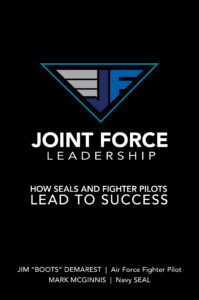Join Force Leadership
Navy SEALs lead on the ground. Fighter pilots lead in the air. Together, they can lead anyone, anywhere. That’s the premise of Joint Force Leadership: How SEALs and Fighter Pilots Lead to Success which brings together Jim “Boots” Demarest and Mark McGinnis’s combined fifty years of military and business experience, and presents battlefield and boardroom tested tools and skills that will resonate with business people, travelers, and military enthusiasts alike.
After reading the book, I reached out to talk to the authors about their views of leadership today.
Before we start on Joint Force Leadership, I’d love your perspective on how the military helped prepare you for the work you do today.
Jim: My military experience started at the Air Force Academy, where I learned so much about leadership. It was really my first exposure to the challenges and opportunities of leading people, especially my work in student government. My 10 years as an Air Force Officer and F-15 pilot put me on the front lines during the Cold War, and dealing with constant vigilance and preparation drove the work ethic I use today. In the end my military experience has taught me to be part of something bigger than myself, and that service is a demanding but rewarding calling.
Mark: Similarly, my experience started at the United States Naval Academy. While attending the academy I was a four-year varsity football player. We, quite honestly, sucked. This taught me a great deal about perseverance, grit, the importance of playing for each other and playing for the love of the game. Tough way to learn these lessons but very powerful. I wanted to be a SEAL but because I majored in football and not academics, my class standing wasn’t high enough to get a SEAL billet. I decided to be a US Marine. But I still wanted to be a SEAL. So I became 1 of 4 Marine officers in 58 years to successfully transfer from the USMC to the Navy and complete SEAL training. This taught me the power of relentlessly pursuing a goal and how to leverage your relationships to help you open doors that are shut. I spent 24 total years in the Teams and held leadership positions at every level. If you don’t learn it there, you aren’t going to learn it anywhere.
The Power of Focus
You start your book on leadership by talking about the power of focus. What advice would you give to someone who is scattered, moves from goal to goal, and recognizes the need for focus, but doesn’t know where to begin?
 Focus starts by taking a hard look inside, and my most important rule is “know thyself.” You must understand your own strengths and weaknesses before charging forward to “fix” something. I have found actively seeking out feedback from people that know me best has helped reinforce my own assessment, or more importantly shined a light on personal blind spots.
Focus starts by taking a hard look inside, and my most important rule is “know thyself.” You must understand your own strengths and weaknesses before charging forward to “fix” something. I have found actively seeking out feedback from people that know me best has helped reinforce my own assessment, or more importantly shined a light on personal blind spots.
Once you know yourself, I think it is important to understand what works for you. By this I mean some people write lists, and can follow them. Others write notes or find inspirational quotes and post them. Others use the calendar to set deadlines. Use a tool you know works for you. Next, ask yourself “what are the most important goals for me?”
Often people pick too many things to work on and never get anything done. Pick a small goal, attain it, celebrate the win, then pick another. People who see results normally stay the course. We identify SMARTS goals in Joint Force Leadership as specific, measurable, achievable, realistic, time bound, and strategic. By strategic we mean they support some larger or more long-term outcome. Start small, drive to a specific outcome, and before long you’ll be on the course you’ve charted for yourself.
Master the Fundamentals
SEALs master the fundamentals. How do organizations use this principle to increase their focus and confidence?
In the SEAL Teams we train to the basic fundamentals. Have we dabbled with the high-speed stuff? Sure. But time and again we revert back to the fundamentals. And I promise you, when you step on a two-way shooting range, and the first bullet comes at you, anything you haven’t trained to mastery in the fundamentals goes right out the window. Being fundamentally sound allows us to slow things down in challenging and hostile situations. We revert to muscle memory and this allows our minds to be free to think and analyze. We also narrowed our focus in terms of the different capabilities we bring to the fight. We used to advertise 9 different mission capabilities. After 9/11 we focused on just two with the attitude of we are going to dominate these two. When we did this our performance went through the roof. Similarly, in business, if you pick just a few things and focus on being the best at them you can dominate. I see too many companies try to be jacks of all trades and they become masters of none. If you train your people to mastery of the fundamentals, they will be much more confident and effective. This will also help them deal with challenge and adversity.
What are some ways that a team develops trust with one another?
Teams develop trust by demonstrating trust through actions not words. If you give someone a goal to achieve, give them the authority and resources, then get out of the way. It is fine to check in along the way, but giving people latitude to decide how to attain a goal develops trust.
Trust is also built by admitting, not hiding, vulnerability. Nobody has all the answers, and if we admit this along the way, then we come across as more human and easier to trust. Finally, if people do things the right way for the right reasons, and avoid taking actions for purely personal gain, we tend to trust them more. Ask yourself, “What qualities do the people I already trust in my life display?” then adopt them as your own.
The Importance of Integrity
You have so many great stories in the book, and one that I remember is about the lessons you learned from Chuck about integrity. Talk a little about the importance of integrity and how it relates to trust.
Integrity is the foundation of trust, and means doing the right thing when nobody is looking. When someone turns in money they found in a bag on the street, or admits to a mistake nobody saw them make, they are showing us they are people of character. Most of the difficult decisions in life and business are not black and white, and to the extent they are difficult, we often must rely on more than just the facts. We look at intentions, motivations, and second order effects. When the decision maker has demonstrated integrity in the past, we can attribute pure motives to their decisions and behavior, whether they turn out well or not. Without integrity, there can be no trust.
What’s the 9-Line and how do we use it in business?
The 9-Line is a standardized communication format that allows for the rapid exchange of information under stressful circumstances between members of different services. In business it is important to understand that every company, and every department within a company, has its own language and micro-culture. The 9-Line idea is to build a common language between companies and departments to ensure information is received and understood as intended. If we can get people to avoid acronyms, simplify language, and incorporate some type of feedback mechanism to ensure the message was received and understood, we can improve communication and efficiency.
“There’s always room for improvement” is right toward the end of your book and encapsulates that constant desire to reach the next goal. How do you instill or encourage this desire in an entire organization?
It is important to understand that your personal and business lives are about the journey not the destination. If we are not moving forward, then we are in fact moving backwards since the rest of the world marches on. As leaders we need to manage the present, but more importantly chart a clear path forward so that people can see where we are going, and get excited about the journey. Companies, products, and services come and go. What is left are the people, and if we demonstrate progress toward both business and personal goals, we model the behavior important to our organization, and along the way motive those around us to join in.
Boost Your Positive Intake
For more information, see Joint Force Leadership.
Photo Credit: Jeff Cooper

